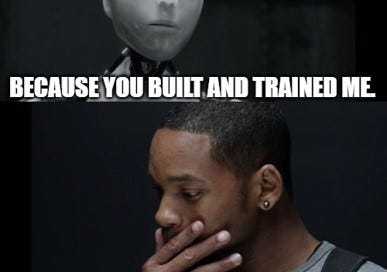The AI Conundrum: How Can Silicon Valley's Latest Gold Rush Become a Public Good?
How to prevent AI from just becoming another product that increases FANGs Market Cap.
As artificial intelligence sweeps through Silicon Valley like a gold rush, a pressing question emerges: Can this transformative technology become a public good rather than another tool to fatten the bottom lines of tech giants?
The numbers are staggering. AI is projected to add $15.7 trillion to the global economy by 2030, according to PwC. Sam Altman, CEO of OpenAI claims that AI will double the world’s GDP. Meanwhile, tech titans are seeing their market caps soar — Microsoft added $100 billion in a single day after announcing ChatGPT integration, and Nvidia's value has skyrocketed from $31 billion to over $1 trillion since 2016, largely thanks to AI chip demand.
But as the likes of Google, Microsoft, and Amazon race to monetize AI, concerns are mounting about the concentration of this powerful technology in the hands of a few.
"We're at a crossroads," said Dr. Fei-Fei Li, Co-Director of Stanford's Human-Centered AI Institute. "AI has the potential to solve some of humanity's greatest challenges, but only if we ensure its benefits are widely distributed."
Turning the Tide: AI as a Public Good
So how do we turn this tide? Experts suggest several key strategies:
Open-Source AI: "Making advanced AI models open-sourced could democratize access and enhance innovation," said Emad Mostaque, founder of Stability AI, whose open-source image generation model has been used by millions.
AI Infrastructure as Public Utility: Just as we treat roads and electricity as public infrastructure, some argue key AI capabilities should be similarly accessible. The National Research Cloud initiative in the U.S. aims to provide researchers and small businesses with access to high-powered computing resources for AI development.
Regulatory Frameworks: "We need smart regulation that fosters innovation while preventing monopolistic practices," said Margrethe Vestager, Executive Vice President of the European Commission. The EU's proposed AI Act could serve as a model for balanced oversight.
Public-Private Partnerships: Collaborations between governments, academia, and the private sector could ensure AI benefits are widely distributed. The UK's Alan Turing Institute is one such example, bringing together diverse stakeholders to advance AI research and application.
The Role of Startup Founders
But what about the scrappy startups and visionary founders that have long been Silicon Valley's engine of innovation? What responsibility do we bear in steering AI towards the greater good?
Focus on AI-Native Problems: Identify problems that are uniquely suited to AI solutions rather than trying to force AI into existing products. "Startup founders are uniquely positioned to challenge the status quo," said Sam Altman. "They can prioritize ethical AI development and focus on solving real-world problems, not just chasing the next unicorn valuation."
Indeed, a new breed of AI startups is emerging, focused on leveraging AI for social good.
Viz.ai, which uses AI to detect strokes faster, potentially saving lives.
Numenta is developing brain-inspired AI architectures that could lead to more efficient and adaptable systems.
Startup founders can also play a crucial role by:
Focusing on AI Ethics: "Building ethical considerations into AI from the ground up is crucial," said Timnit Gebru, founder of the Distributed AI Research Institute.
Embracing Transparency: "Open dialogue about AI capabilities and limitations builds trust," said Joy Buolamwini, founder of the Algorithmic Justice League.
Prioritizing Diverse Teams: "Diverse teams lead to more inclusive AI systems," said Dario Amodei, co-founder of Anthropic, known for its "Constitutional AI" approach.
Engaging with Policymakers: "Startup founders need to be part of the conversation shaping AI regulation," said Terah Lyons, founding Executive Director of the Partnership on AI.
The Road Ahead
As AI continues its march into every facet of our lives, the choices we make now will shape its impact for generations. Will AI be part of the system contributing to existing inequalities, or can it be a rising tide that lifts all boats?
"The promise of AI is too great to leave its future solely in the hands of large tech companies," said Cory Doctorow, author and tech activist. "We need a concerted effort from startups, policymakers, and the public to ensure AI serves the many, not just the few."
As the AI revolution unfolds, the responsibility falls not just on tech giants or policymakers, but on every participant in the AI ecosystem. From garage startups to multinational corporations, the decisions made today will determine whether AI becomes another tool for consolidating wealth and power, or a transformative force for public good.
The clock is ticking, and the world is watching. The future of AI — and perhaps society itself — hangs in the balance.




